Galatians and Paul 2
Char Heydinger

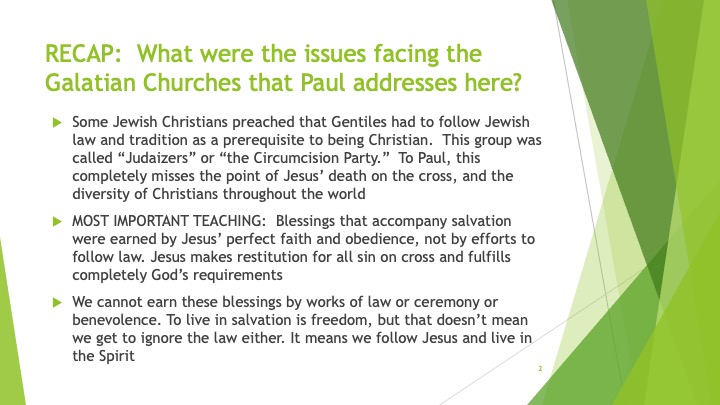
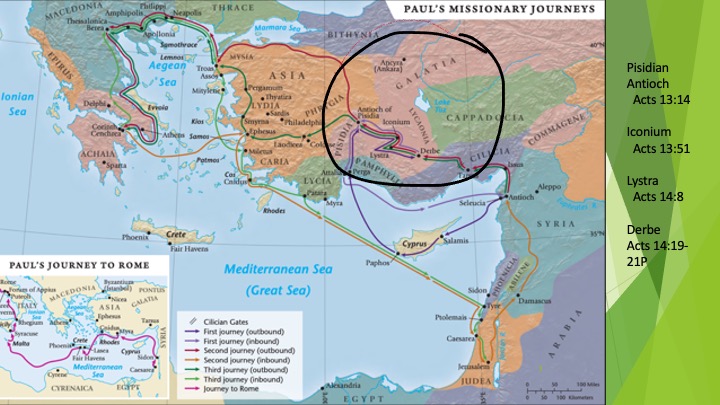
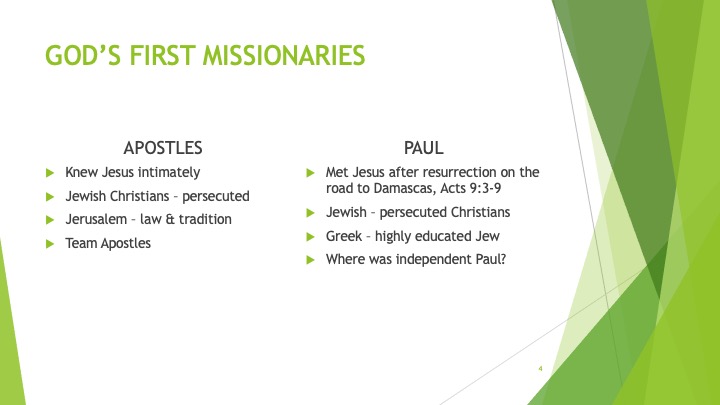
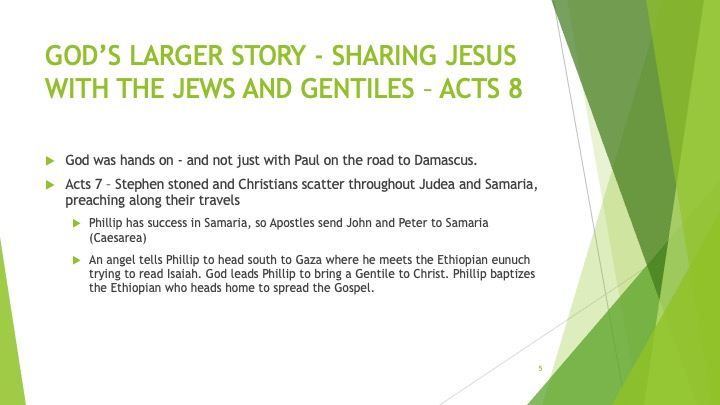
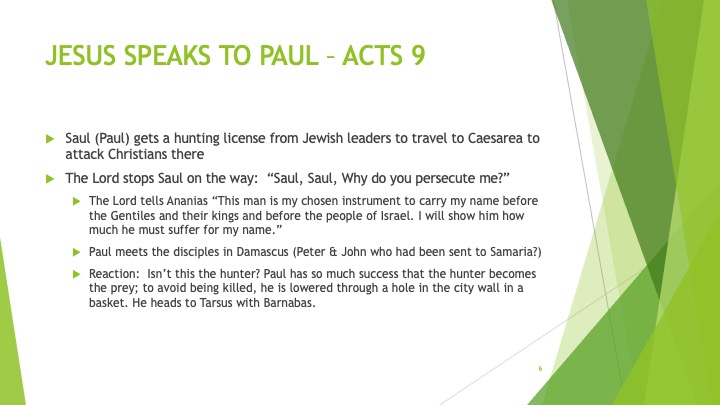

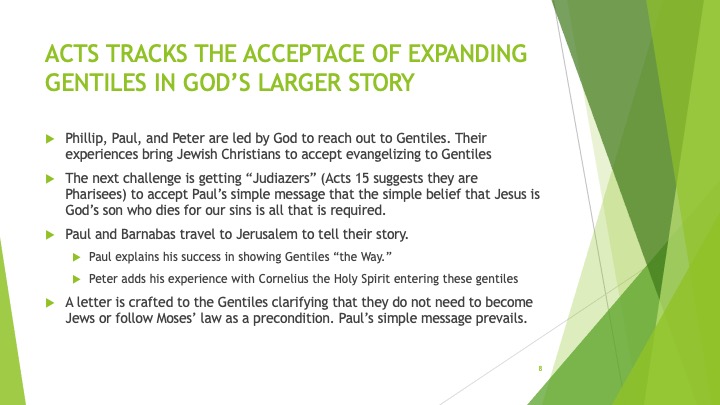
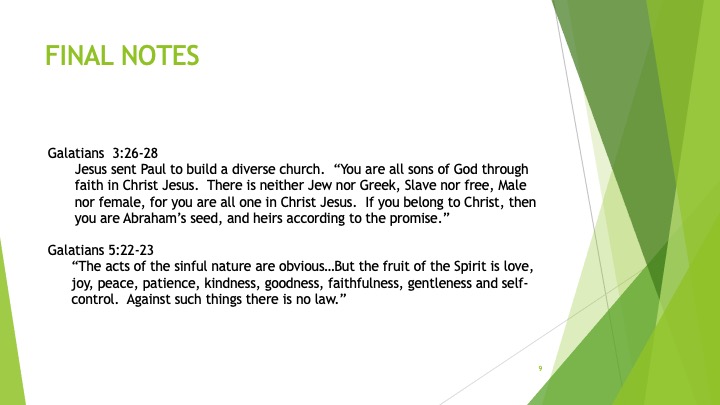
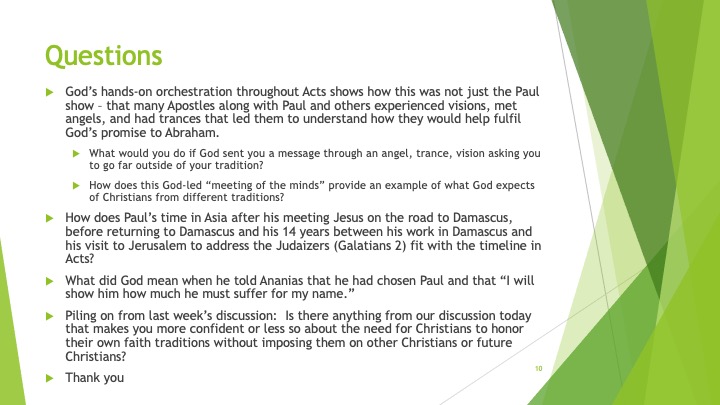
Galatians and Paul 2
Links
< Home Page > < Galatians & Paul Menu > < Top of Page >
Paul’s Letter to Churches
in Galatia Part 2 Text
Paul’s Letter to the Churches in Galatia PART 2:
In the context of Acts
RECAP: What were the issues facing the Galatian Churches that Paul addresses here?
Some Jewish Christians preached that Gentiles had to follow Jewish law and tradition as a prerequisite to being Christian. This group was called “Judaizers” or “the Circumcision Party.” To Paul, this completely misses the point of Jesus’ death on the cross, and the diversity of Christians throughout the world
MOST IMPORTANT TEACHING: Blessings that accompany salvation were earned by Jesus’ perfect faith and obedience, not by efforts to follow law. Jesus makes restitution for all sin on cross and fulfills completely God’s requirements
We cannot earn these blessings by works of law or ceremony or benevolence. To live in salvation is freedom, but that doesn’t mean we get to ignore the law either. It means we follow Jesus and live in the Spirit
Paul’s Missionary Journeys
GOD’S FIRST MISSIONARIES
APOSTLES
- Knew Jesus intimately
- Jewish Christians – persecuted
- Jerusalem – law & tradition
- Team Apostles
PAUL
- Met Jesus after resurrection on the road to Damascas, Acts 9:3-9
- Jewish – persecuted Christians
- Greek – highly educated Jew
- Where was independent Paul?
GOD’S LARGER STORY - SHARING JESUS WITH THE JEWS AND GENTILES – ACTS 8
- God was hands on - and not just with Paul on the road to Damascus.
- Acts 7 – Stephen stoned and Christians scatter throughout Judea and Samaria, preaching along their travels
- Phillip has success in Samaria, so Apostles send John and Peter to Samaria (Caesarea)
- An angel tells Phillip to head south to Gaza where he meets the Ethiopian eunuch trying to read Isaiah. God leads Phillip to bring a Gentile to Christ. Phillip baptizes the Ethiopian who heads home to spread the Gospel.
JESUS SPEAKS TO PAUL – ACTS 9
- Saul (Paul) gets a hunting license from Jewish leaders to travel to Caesarea to attack Christians there
- The Lord stops Saul on the way: “Saul, Saul, Why do you persecute me?”
- The Lord tells Ananias “This man is my chosen instrument to carry my name before the Gentiles and their kings and before the people of Israel. I will show him how much he must suffer for my name.”
- Paul meets the disciples in Damascus (Peter & John who had been sent to Samaria?)
- Reaction: Isn’t this the hunter? Paul has so much success that the hunter becomes the prey; to avoid being killed, he is lowered through a hole in the city wall in a basket. He heads to Tarsus with Barnabas.
THE LORD SPEAKS TO PETER –
ACTS 10
- Cornelius, a Roman Centurion in Damascus is told to send soldiers for Peter.
- An angel says “Cornelius! Your prayers and gifts to the poor have come up as a memorial offering before God."
- Peter goes into a trance and sees a sheet held by 4 corners drop from the sky full of four-footed animals, reptiles, and birds.
- A voice tells Peter “Get up, Peter. Kill and eat.” Peter says “Surely not Lord. I have never eaten anything impure or unclean.”
- The voice answers: “Do not call anything impure that God has made clean.”
- This happened 3 times
- Peter preaches at Cornelius’ home and the Gentiles receive the Holy Spirit
- Peter takes criticism in Jerusalem afterward and explains that the Gentiles received the Holy Spirit and spoke in tongues. Jewish Christians understand that God has shared their experience with Gentiles.
- Phillip, Paul, and Peter are led by God to reach out to Gentiles. Their experiences bring Jewish Christians to accept evangelizing to Gentiles
- The next challenge is getting “Judiazers” (Acts 15 suggests they are Pharisees) to accept Paul’s simple message that the simple belief that Jesus is God’s son who dies for our sins is all that is required.
- Paul and Barnabas travel to Jerusalem to tell their story.
- Paul explains his success in showing Gentiles “the Way.”
- Peter adds his experience with Cornelius the Holy Spirit entering these gentiles
- A letter is crafted to the Gentiles clarifying that they do not need to become Jews or follow Moses’ law as a precondition. Paul’s simple message prevails
Final Notes
Galatians 3:26-28
Jesus sent Paul to build a diverse church. “You are all sons of God through faith in Christ Jesus. There is neither Jew nor Greek, Slave nor free, Male nor female, for you are all one in Christ Jesus. If you belong to Christ, then you are Abraham’s seed, and heirs according to the promise.”
Galatians 5:22-23
“The acts of the sinful nature are obvious…But the fruit of the Spirit is love, joy, peace, patience, kindness, goodness, faithfulness, gentleness and self-control. Against such things there is no law.”
Questions
- God’s hands-on orchestration throughout Acts shows how this was not just the Paul show – that many Apostles along with Paul and others experienced visions, met angels, and had trances that led them to understand how they would help fulfil God’s promise to Abraham.
- What would you do if God sent you a message through an angel, trance, vision asking you to go far outside of your tradition?
- How does this God-led “meeting of the minds” provide an example of what God expects of Christians from different traditions?
- How does Paul’s time in Asia after his meeting Jesus on the road to Damascus, before returning to Damascus and his 14 years between his work in Damascus and his visit to Jerusalem to address the Judaizers (Galatians 2) fit with the timeline in Acts?
- What did God mean when he told Ananias that he had chosen Paul and that “I will show him how much he must suffer for my name.”
- Piling on from last week’s discussion: Is there anything from our discussion today that makes you more confident or less so about the need for Christians to honor their own faith traditions without imposing them on other Christians or future Christians?
Thank you!